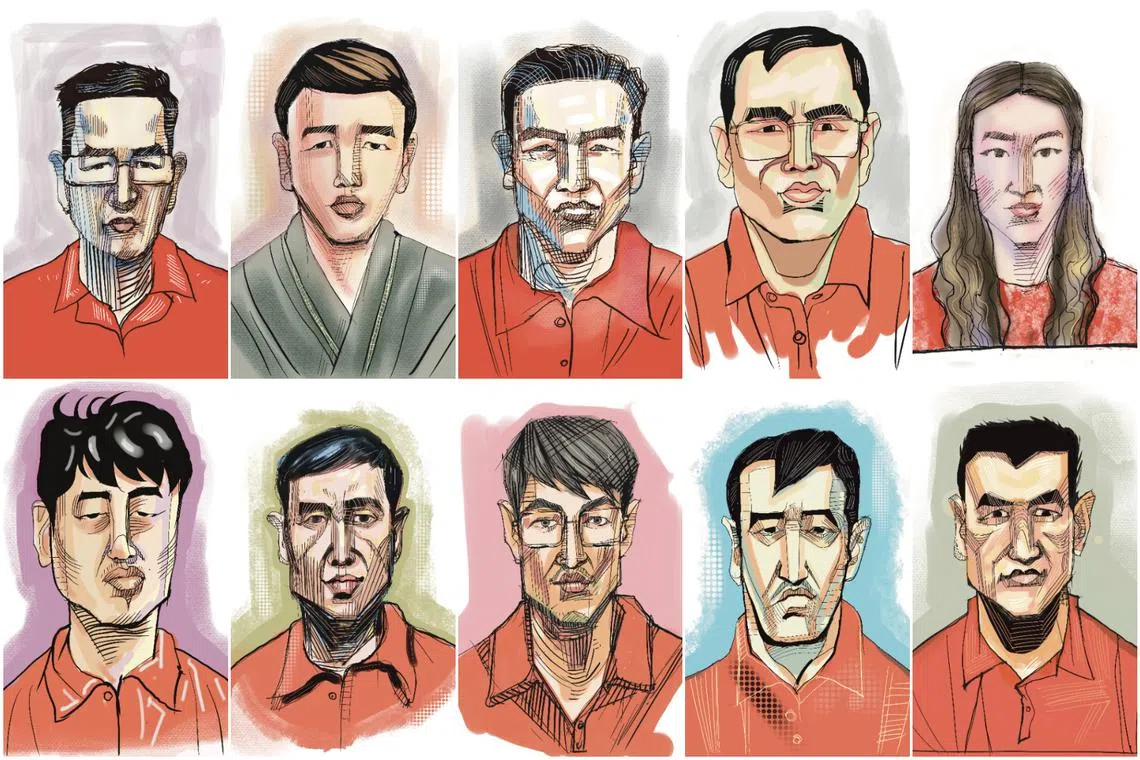Interpol Red Notices not issued for 10 charged in money laundering case at point of EP application
Sign up now: Get ST's newsletters delivered to your inbox

The 10 accused are (clockwise from top left) Su Baolin, Su Haijin, Chen Qingyuan, Su Wenqiang, Lin Baoying, Zhang Ruijin, Wang Dehai, Su Jianfeng, Vang Shuiming and Wang Baosen.
ST ILLUSTRATIONS: CEL GULAPA
Follow topic:
SINGAPORE – Interpol Red Notices were not issued against all 10 individuals arrested and charged in Singapore’s largest money laundering case
Singapore screens applicants for its work passes and other immigration facilities against a database of blacklisted individuals, and also works with foreign governments to verify information provided by them when agencies here have suspicions, Second Minister for Home Affairs Josephine Teo said in Parliament on Tuesday.
A Red Notice is a request to law enforcement worldwide to locate and provisionally arrest a person pending extradition, surrender, or similar legal action.
She was responding to questions from MPs from both sides of the House on how applications for work passes and other immigration facilities are scrutinised and how checks on high-risk individuals are stepped up. These include those with criminal records or who are wanted in foreign jurisdictions, or who may have used false identities.
Among the MPs who filed questions on immigration and work passes were Mr Don Wee (Chua Chu Kang GRC) and Mr Patrick Tay (Pioneer), as well as Associate Professor Jamus Lim (Sengkang GRC) from the Workers’ Party and Non-Constituency MP Leong Mun Wai from the Progress Singapore Party.
Ms Teo said that while it is not possible to conduct verification checks for all applications due to the high volume, the Government will review how to tighten these checks at various points.
This comes after the Republic moved in August on a money laundering case involving the 10 work pass holders and more than $2.8 billion in laundered assets here.
In her statement, Ms Teo said anyone complicit in the wrongdoing after ongoing investigations on the case will be dealt with in accordance with the law regardless of their immigration status, including Singaporeans.
Foreigners convicted of an offence in Singapore may be deported from Singapore, and in some cases, banned permanently, she said.
“Investigations are ongoing, and many persons have been interviewed, and more will be. They include Singaporeans, permanent residents, and those on different types of immigration passes.”
Even as the Republic reviews how to tighten its verification checks, most people are not illegal money launderers or criminals, Ms Teo said.
“If we make the rules too tight, then it is the vast majority of innocent applicants who will be unnecessarily penalised. The crooks will still try to find a way around the rules.
“So we need rules, (and) we need to apply them, but let us be careful about knee-jerk reactions, which may make our business environment unfriendly.”
Speaking in Parliament on Tuesday, Minister for Manpower Tan See Leng said that the majority of work pass holders come to work and contribute to Singapore’s economy, and only a small minority are unscrupulous individuals.
“We therefore must take a sensible approach to calibrating our checks so that we do not hurt bona fide employers.”
In response to questions from labour MP Desmond Choo (Tampines GRC), Dr Tan elaborated on the checks the ministry undertakes as part of wider Government efforts to combat money laundering.
The Manpower Ministry (MOM) checks whether false declarations of salaries and qualifications have been made, and whether companies have business operations that can cover the declared salaries.
Dr Tan said the EP applications of those involved in the money laundering case were approved as they met prevailing work pass requirements on salary and qualifications.
“When asked for the proof of business operations and the ability to pay salaries, the companies which submitted the applications were able to provide supporting documents.”
The ministry uses data analytics to identify higher-risk work pass applications for greater scrutiny.
“Where there is any sign of possible salary fraud, companies are required to show documentary proof of business operations and their abilities to pay salaries.”
Firms can still ask for more proof even after the work pass holder arrives in Singapore or when passes are up for renewal, Dr Tan said.
But some individuals may still abuse Singapore’s work pass framework to enter the country and commit illicit activities, such as in the present case of money laundering.
“Some may pretend to be employed by companies that are actually inactive or dormant, but others may operate companies with an active trading front to mask the movement of their ill-gotten gains, and yet others still may own a portfolio of legitimate and illicit businesses,” Dr Tan said.
Noting that criminals will constantly find new methods to make detection even harder, Dr Tan said MOM’s salary fraud checks should be seen as a first layer of checks within a larger system of checks by the Government to guard against money laundering.
He added that MOM will be part of the inter-ministerial committee to strengthen Singapore’s anti-money laundering regime.
Better sharing of information across agencies would help MOM improve its salary fraud checks, Dr Tan said, adding that the ministry will share salary fraud cases with other agencies to conduct further probes.

